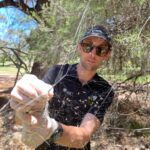Curtin University researchers hope to better understand how dolphins navigate the highly dynamic underwater worlds of our oceans and rivers by analysing the noise environment of the Swan River.
Dr Chandra Salgado Kent, Senior Research Fellow from the Curtin Centre for Marine Science and Technology, manages the research project which aims to build a solid picture of the soundscape of the 20 or so Indo-Pacific bottlenose dolphins that inhabit the Swan River.
Dr Salgado Kent said the dolphins share their environment with many other users including a busy port; multiple car, truck and train bridges; ferries, boats, and various on-shore and marine construction projects.
“On a daily basis, the dolphins must navigate this busy, noisy waterway to successfully forage, maintain their community bonds and social networks, bring up their young and rest when they are tired,” Dr Salgado Kent said.
“Visibility in the water can be very poor and this is certainly the case in parts of the Swan River, so dolphins have evolved an advanced ability to use sound to navigate their environment.
“Unfortunately, we know very little about the sound environments in which dolphins live, and whether in very noisy environments there are limitations to their aptitude to achieve the daily tasks necessary to maintain their livelihood.”
The research team hopes to uncover some of this hidden information by setting up underwater listening stations. The listening stations will measure the soundscape in which the dolphins live, and reveal key locations where noise may interfere with dolphin communications.
“It is by understanding this that we will be able to gain an insight into how flexible dolphins are in coping with a changing and increasingly demanding environment,” Dr Salgado Kent said.
A crowdfunding project has been established to help raise the funds needed to complete the research. Contributions will go towards analysing the data in greater depth, installing new listening stations, and servicing the listening stations. The public can make contributions to the project at https://curtin.hubbub.net/p/dolphins/


